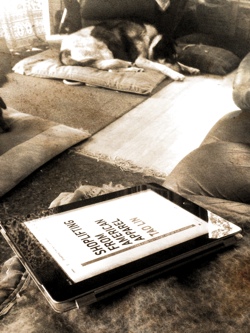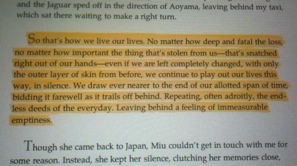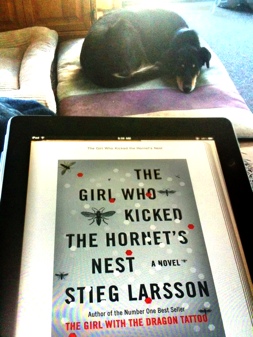I finished the last two of Murakami’s major novels, South of the Border, West of the Sun and After Dark, both read electronically in Apple’s e-reader, iBooks.
South of the Border, West of the Sun is one of Murakami’s “relationship” books, meaning it is primarily about love and sex between the characters, rather than being a mystery or puzzle for the characters to solve. I’m not sure if that’s necessarily the best way to split up his novels, but until After Dark, they break down pretty well this way. I think Norwegian Wood is the best of his books in the relationships category (Wind-Up Bird Chronicle is my favorite in the puzzle category), but South of the Border is a good, melancholy variation on the same theme. There is a lot of what seems like biography in here—the main character owns a jazz bar—and a lot of sadness and the feeling that the main character’s fate is sealed:
Just after I turned twenty, this thought hit me: Maybe I’ve lost the chance to ever be a decent human being. The mistakes I’d committed—maybe they were part of my very makeup, an inescapable part of my being.
I’m not sure how to characterize After Dark since it doesn’t fit into my artificial dichotomy of his books. It’s is also the shortest, and my least favorite of his books. The plot revolves around four characters (one of whom is asleep), and how they spend a single night in Japan. Much of the story is fairly conventional, but some chapters are written from the perspective of what seems like a movie director, giving instructions to the camera and narrating what it shows. I didn’t really get what Murakami was trying to say or do with this part of the narrative and it took away from the rest of the characters I wanted to care about. The book does give a good sense of place and the eerie feeling of being up all night in a city, but that’s all I really got out of it.
As I mentioned, I read both of these books (as well as three others before it) on an e-reader. In general, this was a very positive experience. Because I can read on the iPad and iPhone, it meant a nice big comfortable screen when I was at home, and the ability to read from the same point wherever I happened to be on the phone I carry with me. The ability to easily highlight and take notes, easily find those notes, and the integrated dictionary + google + wikipedia searching was really great. The convenience of being able to read exactly what I want at the moment I want to read it is also a huge benefit to the format.
But I still can’t tell if this is the way I want to consume literature going forward. I like physical books, I like bookstores, and I like having a house with bookshelves filled with books. I can pull them off the shelf, and more often than not, recall various places or times when I was reading them. Sentimental, sure, but there it is. Does convenience, immediate gratification, and technical sophistication outweigh the nebulous goodness of the printed page, the tactile object? I’m not sure. I’ve still got dozens of unread physical books, so I won't have to make up my mind for quite awhile, and I think I’ll be getting Murakami’s latest (to be released in English translation in October) in physical form, despite it’s 900+ pages.

Tallys and Caslon
If it isn't obvious by now, I'm currently working on reading the rest of Haruki Murakami’s novels. I started with Wind Up Bird Chronicle in April 2008, and have only two left at this point. After finishing A Wild Sheep Chase it appears that there is some benefit in reading them in order, as this book and Dance Dance Dance share a few characters and locations. But the plots aren’t connected, so it probably doesn’t matter.
A Wild Sheep Chase is Murakami’s third novel, but is the first that is easily available in an English translation. Like the others, it slowly works it’s magic so that by the time strange things start happening, it seems normal. And the usual Murakami themes (solitude, cats, isolation in nature, etc.) are in evidence. But the whole thing doesn’t quite come together as well as in later novels.
Still, it is a very enjoyable book, and it’s fun to spend time in the strange worlds of Murakami’s characters. South of the Border, West of the Sun is next, and then After Dark. I should have no trouble finishing them in time for the English release of 1Q84.
Shoplifting from American Apparel is part of Melville House Publishing’s “Contemporary Novellas” series. I believe the point of the series is to provide a place for writers to publish short works, longer than what would fit into the usual short fiction outlets. The novella is a complelling format: long enough that the author can stretch out a little and expand on the characters, but short enough to read in a sitting or two. That’s a nice change of pace in between big, complicated books.
Tao Lin’s entry in the series is a collection of brief moments in the life of Sam, a writer who seems to drift around thinking about writing and interacting with whomever happens to be around in the backyards, bars and parties he attends. The writing is crisp and short, and there’s very little plot beyond Sam and where he goes. But at 112 printed pages, I wouldn’t expect a grand plot anyway.
There’s a lot of product placement in the novella, and I suspect that the commercialization of our lives is part of the point Lin is making. At one point Sam started thinking about what his life might be like if he were to really work hard on his writing:
Loneliness and depression would be defeated with a king-size bed, an expensive stereo system, a drum set, a bike, an unlimited supply of organic produce and coconuts, and maybe calmly playing an online role-playing game.
This idea doesn’t get very far, though, and the next scene is largely about the sound a “Synergy” brand kombucha makes when dropped on the ground. I think part of the message here is not that much really happens in real life, and we don’t really know what the moments are that are going to be really meaningful at the time they happen (either that or our lives are basically filled with moments that aren't meaningful).
Anyway, it was a fun read. I like the style and the way Sam moves through his world, but it makes me wonder how Lin would handle a longer format. I wouldn’t want to have read much more than the length of this book at least not without something actually happening.
Sputnik Sweetheart is a book about loneliness. There are three main characters, including the narrator who is in love with one of the women in the story. She is in love with the other woman in the story, who can no longer love at all after losing half of herself atop a ferris wheel in Switzerland. If that sounds strange, well, it’s Murakami.
It’s a short book, slow moving, but very captivating. Cats appear and disappear, and there’s even a dog or two. But loneliness is the primary emotion. This section reminds me of a Buffy episode where a girl actually does disappear because no one pays any attention to her:
But past a certain point nobody talked to me anymore. No one. Not my husband, my child, my friends . . . no one. Like there was nothing left in the world to talk about. Sometimes I feel like my body’s turning invisible, like you can see right through me.
Good book. Maybe not Murakami’s best, but very enjoyable.
The Girl Who Kicked the Hornet’s Nest is the third book in Stieg Larsson’s Millennium Trilogy. If you’ve read and enjoyed the previous two books, you will enjoy this one as well. Like the others, once you get into it, it is difficult to put the book down.
It’s not great literature, and there are hard to overlook flaws (anytime an interesting woman appears, there is a good chance the main character will eventually sleep with her), but it sure was fun to read. I’m looking forward to watching the movie.
This was the first book I read electronically, on an iPad and iPhone. I didn’t think I’d like this as much as I did, and will likely read a lot of books this way in the future. The only limiting factor for me is that most electronic books include Digital “Rights” Management (DRM) encryption, which means that it is a real hassle (and is probably even illegal in the U.S.) to convert these books into formats that can be read on different sorts of eBook readers. I don’t like the idea of buying something that I can only read on a particular device or software package because the support for that system could easily disappear in the future. Plus, if you buy books from multiple different sources, you have to have a different reader for each of them. For now, I will probably only purchase books using formats without DRM, or with DRM that is easily circumvented (like the Kindle format, for example).



